For the past 10 years, Serbia has been implementing a failed economic policy. This has been an economic policy based on public spendings, import, state-controlled industry, subventions, throwing money out of the window, corruption, lack of rational reforms and constant hope that foreign investors will regenerate Serbia. This quicksand did not just cost us the mentioned 10 lost years, but also some 300.000 lost jobs, destroyed economy, public debt that amounts to 60% of GDP and the deficit greater than 6% during this year, but projected to be at the same level in the following year as well.
Our hope in foreign investors as Serbian saviours is of mythic proportion. The only greater thing is our wish to avoid facing reality, not to change, to keep everything the way it is – while things get better. Since we are unable to change, it is logical that foreign investors are our only solution. We have no other option. They are our favorite unspoken excuse for why it is not really so bad that we are not changing. Someone else will do it instead of us. Instead of working on the development of our economy, we are fantasizing that foreigners will come and do it for us. This is, of course, a capital nonsense. All investors, domestic as well as foreign ones, work for profit.
If we cannot help ourselves, nobody will help us. The main focus of our economic policy must be local economy. Domestic businessmen. Domestic investors. Domestic economy consists of all companies working in Serbia, hiring people in Serbia and paying their taxes in Serbia, regardless of whether they are owned by Serbian citizens or foreigners. The main focus of economic policy must be unburdening of domestic economy and creation of favourable business environment. The best way to draw foreign investors is to create healthy state and good business environment for domestic economy. The best signal to foreign investors is the success and profit of domestic companies. We do need foreign investors, and they are welcomed. However, foreign investors are an icing on the cake. Domestic economy is the cake. We failed to make the cake.
We have gone through catastrophic process of privatization. Instead of using this great, once-in-a-generation opportunity to revitalize our economy, privatisation process turned into a great robbery. As a member of this generation, I am ashamed of this. Greater part of privatisation boiled down to snatching of building land. New owners took great bank loans and instead of using it to invest into company development and growth of its core business, they took it out of the country via their offshore companies, thus bringing their own companies to the verge of disaster. The state just stood watching it all happen. Why would anybody do such a thing with their own company? First, the company is not really theirs. Even the privatisation money came from some loan. But, the offshore company is theirs. And they indeed took great care of that one. These companies also ruined the banks which gave them loans. Official NPL (non-performing loans), when it comes to companies, amounts to 22%. Unofficial NPL in some banks amounts up to 50%. Amongst those debtors, we have some of our best working companies with healthy core businesses.
Cutting the Deficit
Two most important measures for cutting the deficit regard companies undergoing restructuring and public companies.
We still have 179 non-restructured companies, former giants, that we throw 750 million dollars at annually. They employ over 50,000 workers. Besides those companies, Privatisation Agency is managing an additional 430 companies with more than 50,000 workers. In total: over 100,000 people. And that is not all. Privatisation Agency has over 900 companies with minority state-ownership in its portfolio. They employ approximately 135,000 people.
And then, there are public companies: almost 600 of them. We annually spend additional hundreds of millions of Euros for public companies. These companies are not profitable, but are part of social politics that the whole society keeps paying a huge price for. They are also the source of bad contracts which are drawing huge amounts of money from these companies into private pockets, usually belonging to some party members.
We created the whole system of subventions, funds and state agencies for these companies, a system of non-payment of invoices, system of privileges and destruction of healthy competition. It is around this system that, throughout years, a wide circle of people gathered from various parties, in order to milk it. They are parasites on the back of the healthy tissue of private economy.
These are the greatest causes of our deficit and the rise of our public debt. This is no longer sustainable. Our state and our society has to say ‘enough’. All companies have to be built on healthy foundations, if possible. They need to be restructured and freed of any debt. If that is not possible, they should close down. Economy must be based on profit. Every healthy economy is based on profit.
This throwing out of money and huge deficit are not the greatest damage for our society. The greatest damage is the fact that healthy way of doing business, based on competition, profit and positive selection, becomes senseless. The system we now have kills any initiative and attempt to create healthy economy. Interests of users of this system are directly opposed to interests of society, and they are fighting to prevent any attempt to clean our society of this parasite. The cost is paid by all citizens of Serbia and all our children. In order to cut the deficit, we have to cut down on public spending. We have to stop throwing money into the well. Perpetuum mobile economy does not function. Subventions do not function. If they did, after ten years, we would have had some results. Lack of results is, hopefully, obvious to all citizens of Serbia. We have to say: enough. Anglo-Saxons say that, once you find yourself in a hole (in a problem), the first thing you have to do is – stop digging. The solution is never found deeper within the hole.
Ministry of Economy introduced the principle of complete transparency, when it comes to spending of taxpayers money. The time has finally come for us to understand that the money belongs to all taxpayers: to workers in Pirot, cleaners from Belgrade, pensioners from Valjevo. And we need to act responsibly with this money. Ministry of Economy published detailed data about budget spendings on the monthly basis on its website. This was done not only for spendings linked to the Ministry, but also all spendings of agencies that are under Ministry’s jurisdiction. Data included the list of companies that received taxpayers money, as well as the amounts. Without exception. During first 7 months of this year, Ministry was spending approximately 2 billion dinars per month, but in August this amount grew to 4.5 billion. In September: 25 billion dinars. The difference is due to subventions.
In September, Ministry of Economy launched a big project of creating IDs for all 609 companies that are in Privatisation Agency’s portfolio, as well as for 35 public companies owned by state. IDs of communal public companies were left for the second round. IDs are simple Excel tables with financial reports, lists of property with estimation of its value, lists of debts, buyers, suppliers, mortgages, court cases. Provided that company accounting is done on regular basis, one does not need more than 7 days to create this ID.
Not throwing money into the well was established as a new principle. All problematic companies owned by state could get help only after they submit their IDs, and only within the context of planned reconstructuring and establishment of healthy foundations. This is true for ‘Galenika’ as well as ‘Simpo’ and ‘Politika’ and ‘FAP’ and ‘Srbijagas’. Same principle for everybody.
Resistance was huge. Especially in public companies. It slowly grew into open hostility and threats.
General and other managers of these companies seem to have believed that this is just a passing project and that they will get their money in the end, as they used to before. Therefore, they procrastinated and avoided submitting requested data. In the end, they finally realized that they will get no money without restructuring. They started cooperating.
A new frame for privatisation was set. Drafts of new laws about privatisation and bankruptcy will be on the agenda at the government’s meeting this week. We expect them to be adopted by the end of this year. The key changes in these laws are full transparency and responsibility of state institutions. The first step towards transparency is the publishing of IDs for all companies undergoing the process of privatisation. All potential investors can then see all relevant data about companies that are being privatised. The goal of restructuring is to eliminate debt and find buyers for clean companies.
The new Law about Privatisation prescribes the change of management if it fails to cooperate with state institutions. The obligation of business analysis of the past 5 years is introduced, regardless of whether company is in bankruptcy or undergoing privatisation. Analysis is to be published in a transparent way. We have much more dubious privatisations than 24 that Verica Barac was talking about. We have to thank her for the fact that these 24 were never forgotten.
We are also preparing changes of Law about Public Companies. They will introduce obligatory licensing of all managers and members of supervisory and executive boards. Full transparency is introduced into public companies that have a monopoly in their line of business, as well as obligation to submit reports to the state and citizens. Managers who fail to respect this, will be replaced.
Deficit cut comes in the form of introducing order within companies that are undergoing restructuring, as well as within public companies. This does not sound like nuclear physics. It is more a reinvention of a wheel. Problem does not lie in the idea, but in its implementation. There is no political will to implement simple principle: I am not giving you any more money. And resistance is huge, above all within political parties and all those whose interests are threatened by such a policy.
Universal Social Care System
We need full reform of social care system for people who are unable to provide for their family for various reasons, whether temporarily or permanently. Instead of hundreds of various social care systems for this and that and subventions for all sorts of things, we need one universal system. For example, help can be established as 15,000 dinars per month per family, with additional 5,000 dinars per family member. Therefore, family with three members would receive 25,000 dinars of help per month. Current social care budget would thus cover social care help for 500,000 families, i.e. some 1,500,000 citizens.
There was much talk about social cards that this kind of system would rely on, and much was said about it being too expensive to implement, requiring several years of preparation. That is probably not true. System is based on simple application of a family that needs help. In this application they submit data about their financial status under full substantive and criminal liability and thus enter the system and start receiving help. Parallel to this, deep and detailed control of applications is done by random choice. Penalties for those found to have been stealing money from Serbian citizens in this way by hiding their true financial status should be draconic.
Growth and Employment
Besides throwing money into the well, the main deficit problem is the lack of growth. This is manifested as decrease of tax income. Our second key problem is decrease of income. We have planned for 1 billion Euros bigger income than we actually had. Revisions were made, but even the revised budget was bigger than the income received by 200 million Euros. Debt amounting to 60% of GDP is a huge problem if your growth is just 1%. This problem is a bit smaller if growth is 5%.
Therefore, we need growth. Growth brings employment and new job openings, as well as new tax income.
Vladimir Gligorov and I talked about the lack of growth on several occasions. We agreed on the necessary strategy. As a result of our talks, I asked him to write a document titled ‘Advice to the Minister of Economy’, which he published on Peščanik website. Recommendations are very clear: public spending cuts on one side, and tax cuts stimulus on the other. Public spending cuts performed via final solution for problematic public companies and companies undergoing restructuring. Finding solution for bank NPLs. Regulatory reform. Labor tax cuts.
In order to have growth, we need to make sure that businesses can operate efficiently. We need to improve business environment. Two laws are key for this: Labor Law and Law about Planning and Construction.
Labor Law will solve the problem of severance pay that is linked to the number of years a person spent working. In the future, severance pay will be linked to the number of years a worker spent with his last employer, as opposed to full amount of working years in life – as was the case until now. Many employees, especially those working for the state, received several severance pays. Labor Law should also make hiring and firing of workers easier. The end goal is employment growth. Some people are wondering how easier firing can lead to employment growth? In great many cases, employers are not firing people because they are angry. Even if your employer belongs to the minority of angry employers, it would anyways be better for you to run away from them. However, employers usually fire people because there is no work or because they think that workers are not up for the job. How difficult it is to fire someone is directly linked to the ease with which employers will hire people. If there is a great risk that a bad worker will sue you and win a court case against you, the costs of which might even ruin a small family firm, then you will do everything to avoid hiring anybody permanently if at all possible.
Law about Planning and Construction should greatly simplify the procedure of acquiring building permits. Second important issue that it should resolve is the issue of construction land usage rights. This undefined right is the great cause of our failed privatisation process and procrastination of bankruptcy procedures.
What about growth? What will growth and employment bring us? Improvement of business environment will surely improve the state of affairs. However, it will not provide for a necessary injection of adrenalin that our economy needs. How can we stimulate economy?
The best, most transparent and most efficient ‘subvention’ is cutting of labor tax. In Serbia, when you legally employ a worker, in order to pay him a salary of 180 Euros, you have to pay additional 120 Euros to the state. In addition, if a house painter or a web developer contract a job worth 300 Euros, in order to do their business legally, they need to pay 120 Euros of it to the state. This is unreasonable. There is no tax police in the world that would manage to enforce this rule.
The problem of our tax system is not that our average tax rate is too high, but the fact that it is not progressive. State wants to take 120 Euros of the first 300 you earn, even if this is a bare minimum one needs for biological survival.
This tax policy is the main cause of black and gray market (part of salary is received legally, but other part in cash). It is estimated that we have over 500,000 people employed in the black market, and that the size of gray economy and black market amounts to over 30% of our GDP. Even Strauss-Khan noticed the fact that the size of gray economy, and transfer of even its small part into the legal flow, represents our greatest short-term chance for significant growth.
How to deal with this grey economy? We should cut labor tax by cutting amounts for contributions and introducing progressive income tax. Suggestion is to cut down contributions that employer needs to pay from 17.9% to 10%. Contributions that employee needs to pay would go down from 19.9% to 15%. Progressive income tax would be introduced in such a way that gross salary up to 15,000 dinars would have a 0% rate; from 15,000 to 50,000 dinars – 20%; from 50,000 to 150,000 – 30%; and above 150,000 dinars – 40%. This kind of labor tax cut would make a budget hole of around 30 billion dinars. One third of this, 10 billion, is linked to public companies. Since they are also receiving subventions, this means that the budget hole would be less than 25 billion dinars. This could all be paid in full in subventions are cut down.
Step 2 would be implemented in the years to come, and would consist of further cuts of contributions that employees are paying, from 15% to 10%, then further to 5%, until in the end it would be completely abolished. Precondition of further cuts is the increase in number of taxpayers and more efficient charging of tax.
With introduction of this kind of tax system, significant number of companies would stop hiring people in the black market, because economic interest to do that would disappear. Tax and contributions for minimal pay would amount to 28%, instead of the current 60%.
Netto salaries would grow, especially in the second round of reform. Health system would no longer be financed from contributions, but out of the budget. All citizens would have access to health insurance, regardless of whether they are employed. The need to stamp health ID cards would become part of the infamous history.
A year ago we were faced with a similar problem: huge deficit, increase of public debt and decrease of income. We decided to tighten the belt, to cut spendings and raise taxes. We did nothing to allow growth. The result of these measures is that we are now 4 billion Euros deeper in the hole, with greater deficit and decreased business activity. In the absence of growth, belt tightening and tax raise decreased aggregate demand and economic activity. We should not repeat the same mistake. Even before new measures were implemented, GDP growth in second quarter fell to 0.2%. Without stimulus we are on our way to the third recession. The belt needs to be tightened, but we have to have an appropriate stimulative measures for the economy. That stimulus is cut of labor tax. It is my deep conviction that this is the most important thing that we can do for the recovery of our economy, for empowering competition and stimulate production and export: to make employment cheaper and therefore make production profitable.
Enough is enough. We cannot keep on going like this. We have to turn the other page. If not for us, then for our children. What we spend today, we spend on their account. They will pay for all our bills. That is shameful. To prevent losing another 10 generations of children who will come of age in the country of quicksand, corruption and no future, we need to stop behaving irresponsibly now. Enough is enough.
Sasa Radulovic




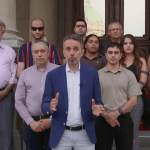
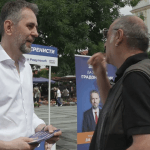


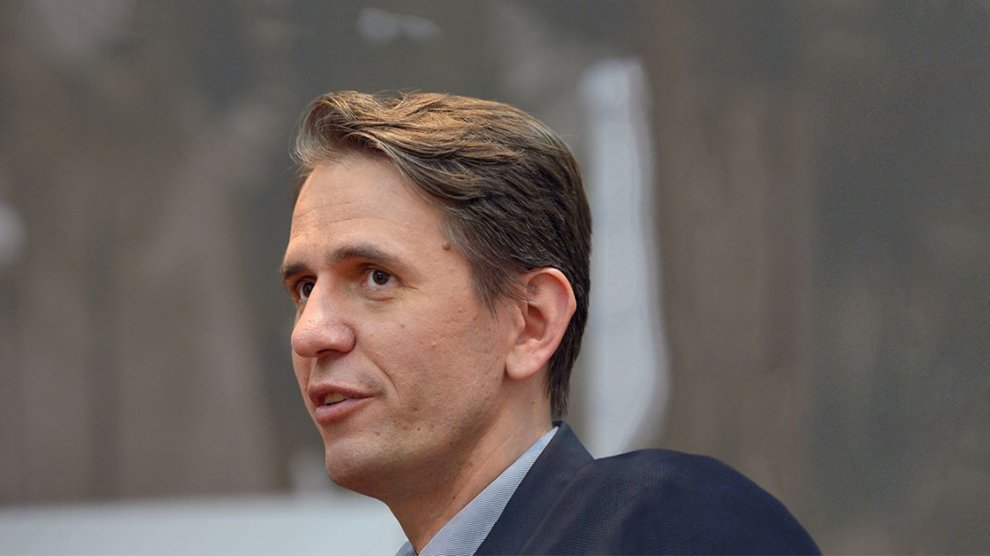
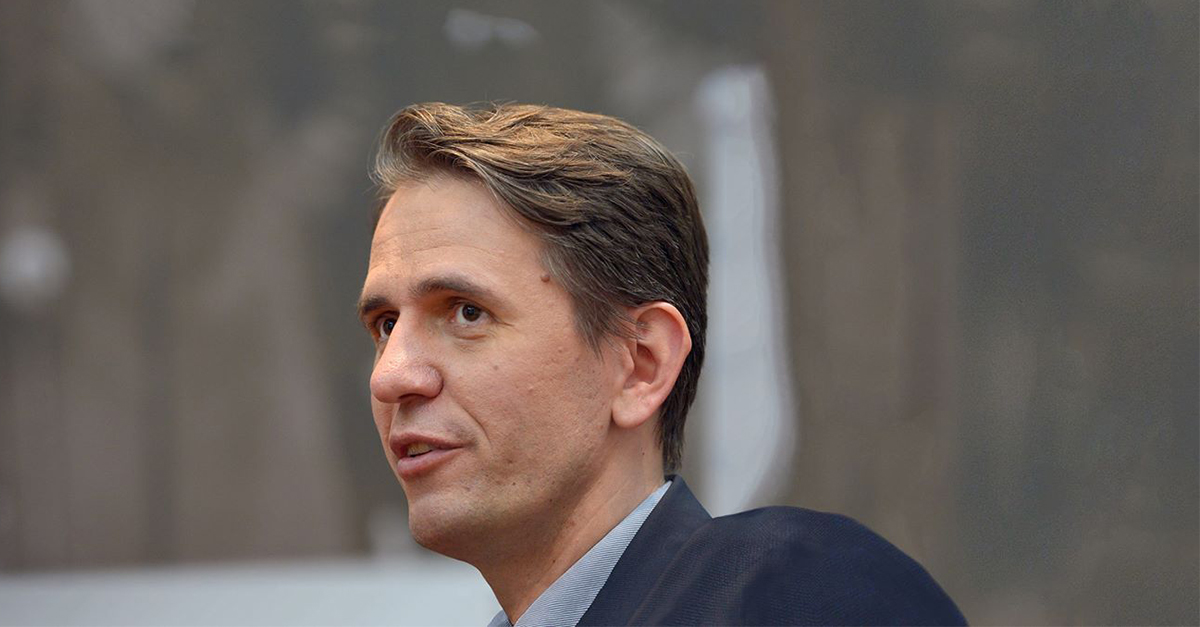
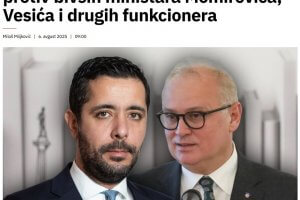


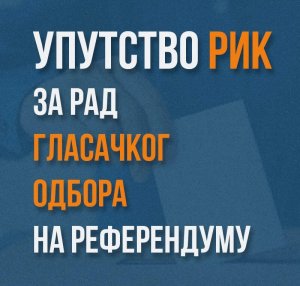
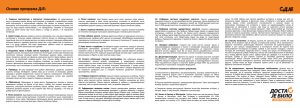
Коментариши